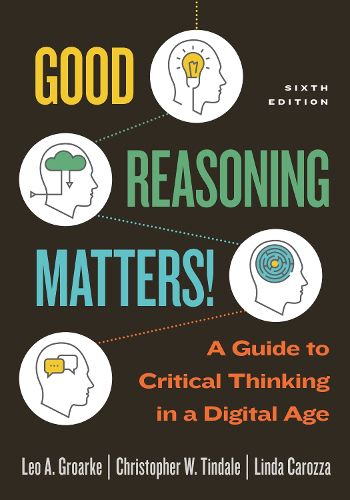Readings Newsletter
Become a Readings Member to make your shopping experience even easier.
Sign in or sign up for free!
You’re not far away from qualifying for FREE standard shipping within Australia
You’ve qualified for FREE standard shipping within Australia
The cart is loading…






Good Reasoning Matters! teaches students how to decipher, evaluate, analyze, construct, and engage in argument. This sixth edition incorporates many timely topics, including the impact of artificial intelligence and social media on how we propose and respond to arguments. The instruction in the book is rooted in traditional philosophical understandings of argument, but is expanded to account for the complexities that characterize real-life arguments. This includes an examination of the role that images, sounds, and other non-verbal components play in attempts to convince us of some point of view-in advertising, television, YouTube, film, interpersonal exchange, and elsewhere. Numerous and varied exercises-formative within the chapters and summative at their end-help students improve their reading, reasoning, and writing skills. Instructors will find the text is informed by research in digital pedagogy and works well in a variety of course formats: in-person, remote, hybrid, and synchronous or asynchronous delivery. The authors' expertise in argumentation theory and decades of teaching experience ensure that this book prepares students for the complexities of arguing in the 21st century.
$9.00 standard shipping within Australia
FREE standard shipping within Australia for orders over $100.00
Express & International shipping calculated at checkout
Good Reasoning Matters! teaches students how to decipher, evaluate, analyze, construct, and engage in argument. This sixth edition incorporates many timely topics, including the impact of artificial intelligence and social media on how we propose and respond to arguments. The instruction in the book is rooted in traditional philosophical understandings of argument, but is expanded to account for the complexities that characterize real-life arguments. This includes an examination of the role that images, sounds, and other non-verbal components play in attempts to convince us of some point of view-in advertising, television, YouTube, film, interpersonal exchange, and elsewhere. Numerous and varied exercises-formative within the chapters and summative at their end-help students improve their reading, reasoning, and writing skills. Instructors will find the text is informed by research in digital pedagogy and works well in a variety of course formats: in-person, remote, hybrid, and synchronous or asynchronous delivery. The authors' expertise in argumentation theory and decades of teaching experience ensure that this book prepares students for the complexities of arguing in the 21st century.